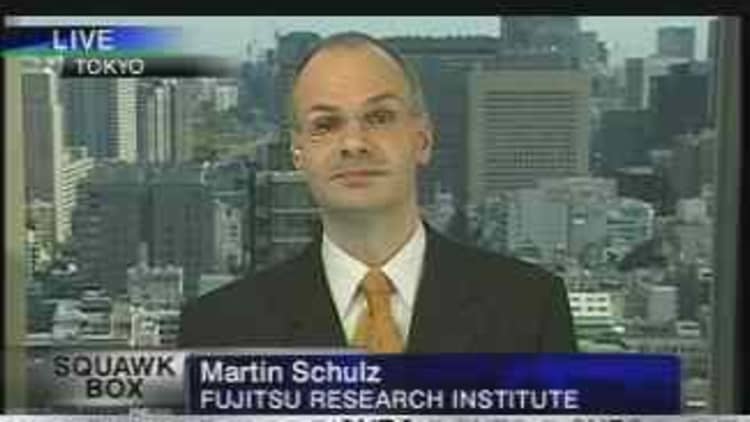Business sentiment among big Japanese manufacturers has sunk to a four-year low, a Bank of Japan survey showed on Tuesday, in further evidence of a worsening economic outlook and reinforcing market speculation that the central bank may cut rates later in the year.
Worries about the global credit crunch, rising raw material costs, fragile stock prices, and a rise in the yen contributed to weakening confidence, and the outlook for the coming quarter was even more bleak.
Eroding optimism also led to the weakest capital spending plans by large firms in six years and economists warned companies were still underestimating the rise of the yen, suggesting further profit and capital expenditure downgrades to come.
"The BOJ faces a difficult situation, with a growth slowdown coming at a time when consumer prices are rising," said Joseph Kraft, managing director at Japanese Capital Markets at Dresdner Kleinwort. "It's highly likely the BOJ will keep interest rates on hold in coming months, but this tankan suggests the probability may rise for a rate cut before the year-end if data in coming months is weak and back up the deterioration in sentiment."
The BOJ's closely watched tankan quarterly corporate survey showed the headline index of big manufacturers' sentiment fell to plus 11 from plus 19 in the December survey, below the market's median forecast of plus 13.
That was the lowest since a reading of plus 7 in December 2003, but financial markets mostly took the survey in their stride.
The yen was sold marginally against the U.S. dollar after the survey to trade around 99.80 yen, while Japan's Nikkei 225 Average rebounded led by Sony, shrugging off the survey.

The outlook index for June was seen at plus 7, suggesting big manufacturers expect conditions to worsen over the next three months.
The index measures the percentage of firms reporting a favorable business environment minus those reporting unfavorable conditions.
The tankan, meaning short-term economic outlook, also showed big firms planned to cut capital spending, which has been a key engine for Japan's growth, by 1.6 percent in the business year that started on Tuesday.
That was the bleakest capital spending reading for a March tankan since 2002, although companies tend to be cautious on capex at the start of the business year and gradually revise up their plans as the year progresses.
Japan's economy grew a surprisingly strong 0.9 percent in the last quarter of 2007, but economists expect it to slow in 2008 amid fears that the U.S. economy -- Japan's No.2 trading partner after China -- is heading into recession.
Japan's annual inflation hit a decade-high 1.0 percent in February, but that was due to rising oil and food prices and not prompted by an improving economy, placing the central bank in a tough spot to balance rising prices with the slowing economy.
No rate move is expected by most economists when the BOJ's policy board meets next on April 8-9. Market players expect the central bank to leave interest rates at 0.5 percent for a while, but some see a rate cut on the horizon.
Investors are pricing in a 25 percent chance of a central bank rate cut by June and a 55 percent chance of the cut by the end of the year.
"When the index goes down for two straight quarters, about 80 percent of the time the economy risks tipping into a recession," said Yoshikiyo Shimamine, chief economist at Dai-ichi Life Research Institute.
Further deterioration in the U.S. economy, recent declines in industrial production at home and weak share prices are also weighing on the world's second-largest economy.
In the first three months of this year, the Nikkei has shed 18 percent, its worst performance since a recession in 2001.
The yen has risen about 10 percent against the dollar so far this year and according to the tankan, big manufactures now see the dollar averaging 109.21 yen for the fiscal 2008/09, down sharply from their previous outlooks but still putting the yen much weaker than it is trading at currently.
"This indicates ample possibilities for downward revisions in capital spending and earnings outlooks. I worry about the negative implications going forward," Shimamine said. "But I don't expect a rate cut by the BOJ. They will likely maintain that the current rate level doesn't leave room for a cut and the economy is still generally growing."
Adding to concerns over the murky economic outlook, policy paralysis in parliament has left the central bank without a permanent governor and sparked speculation that Prime Minister Yasuo Fukuda may lose his job.

